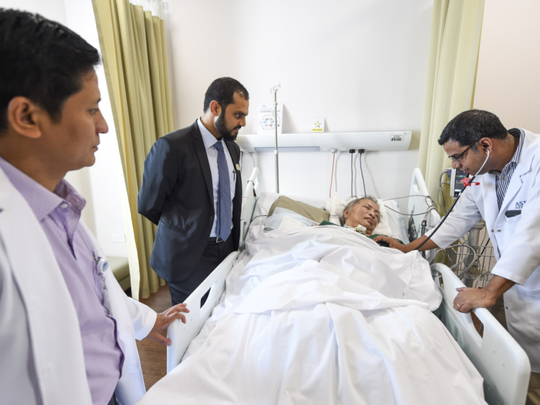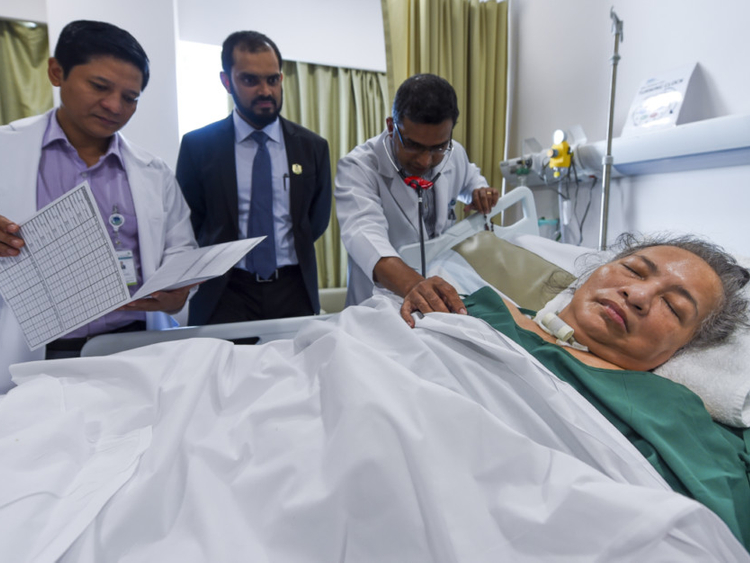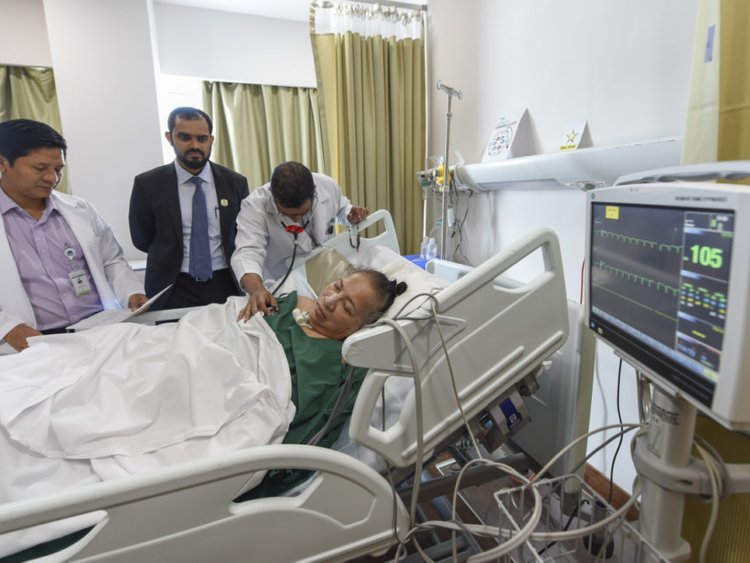
Dubai: Nobody wants to meet Alicia De Los R., not even her son, as she blinks and shuts her eyes in a city hospital with the staff being her only companions.
The 53-year-old Filipina, who suffered hypoxia (lack of oxygen to the brain) during a cardiac arrest, has been lying in a vegetative state at the Aster Mankhool Hospital for the last four months, awaiting repatriation to her country with no one coming forward to help.
It is also a sad reminder about the fate of many such patients either on visit or expired visas lying in a coma state in public and private hospitals in the country with nowhere to go.
Dr Chaitanya Prabhu, a specialist in internal medicine and an intensivist attending on De Los, told Gulf News that the patient who had worked in the UAE for 14 years was on a tourist visa, visiting her son.
On June 7, she was brought to the hospital emergency by a cab driver. She was feeling uneasy and, instead of calling for an ambulance, hailed a cab and asked to be driven to Rashid Hospital emergency, But on the way, she collapsed with a massive cardiac arrest and her brain was deprived of oxygen.
The cabbie rushed her to the emergency section of the hospital where she was resuscitated and stabilised. However, the lack of oxygen and blood supply to her brain resulted in extensive damage to both lobes rendering her in a coma.
Dr Alai Taggu, head of the department of critical care at the hospital attending on Alicia, said: “The patient had a history of diabetes and hypertension and we made sure her air passage is clear and have a tracheotomy tube in her throat to clean the air passage. She is breathing on her own.”
The hospital has in the last four months spent Dh500,000 on her care as she has no insurance cover and her son who is unable to afford the hospital expense has also stopped taking any calls from the hospital staff.
The hospital is facing a typical situation where it wants to free the bed for other needy patients and also make sure the patient is reunited with her family back home which to some extent will emotionally rehabilitate her. They are looking to repatriate her to her country, but the Philippines Consulate has allegedly not yet responded positively to their request.
Dr Sherbaz Bichu, CEO of the hospital, said: “We have done what we could, and see that the patient might be better off if flown home and is with her loved ones. She needs to be in a similar hospital or health-care facility. So far, the authorities at the Consulate have not been able to find a similar hospital to work out her repatriation. There is nothing more we can do for Alicia now. It is very sad.”
Meanwhile, Philippine Consul-General Paul Raymund Cortes told Gulf News that the consulate "has been in charge of Ms Alicia's case from day one".
"We have been coordinating with hospital authorities and administration in regard to her condition and to her hospitalisation bills. Secondly, the Philippine government through the Consulate-General in Dubai is taking charge of her medical repatriation and she is scheduled to leave for the Philippines on the 26th of October. Lastly, it is the Philippine government through the Philippine Consul-General in Dubai that has financially assisted Ms Alicia in taking care of her repatriation and her hospital expenses as well. We've also visited Ms Alicia from the very beginning and we have never failed on that matter," Cortes said.
Alicia's case is not an isolated one. Last week, Gulf News reported the sad plight of a 27-year-old Ethiopian maid in a coma at the International Modern Hospital waiting to be repatriated to her home country.
Dr Bichu also pointed out that such cases where tourists or family members of blue-collar workers who came without a travel insurance proved to be tricky. “We are bound to help them but need someone to step in now. There are also many cases of underprivileged families, flying in their parents for a holiday and finding their aged parents in similar medical conditions. We want to caution them that there is no arrangement to pay bills and many of those have lost all their life’s savings by paying off hospital bills.”
There is another case of an Indian expatriate journalist, who is currently out of job and who suffered a cardiac arrest, admitted to the same hospital. “This gentleman, who is in his seventies, was lucky to have suffered a cardiac arrest while at the outpatient department of the hospital. But he is out of job and without an insurance. His condition is stable but he continues to be at our hospital. We have no clue what to do with such patients as hospital bills mount. It is sad because these patients need to be with their loved ones and are indefinitely trapped here,” said Dr Bichu.
A social worker at one of the government hospitals in Dubai confirmed that there were plenty of similar cases of road trauma or stroke victims in comatose conditions lying at hospitals with volunteers of social organisations such as the Valley of Love trying to raise funds for their treatment and repatriate them to their home countries.
While the Dubai Health Authority’s Mossadah Committee raises funds through charities and telethons to help out underprivileged patients, these barely cover the cost of treatment for cancer, dialysis, cost of surgeries and medicines.
The committee was able to pay the medical bills of nearly Dh67 million to help 1,640 patients in 2015. In 2016, the committee raised Dh108 million to help the underprivileged in hospitals. So far this year, the committee has raised Dh250 million that will help nearly 3,000 patients.
However, there seems to be a huge gap wherein many such comatose patients with mounting bills lie in hospital beds as their families and consulates look the other way. The government is in the process of creating a special public fund for such patients. Until this happens, the hospitals are compelled to bear the cost of caring for these patients.














